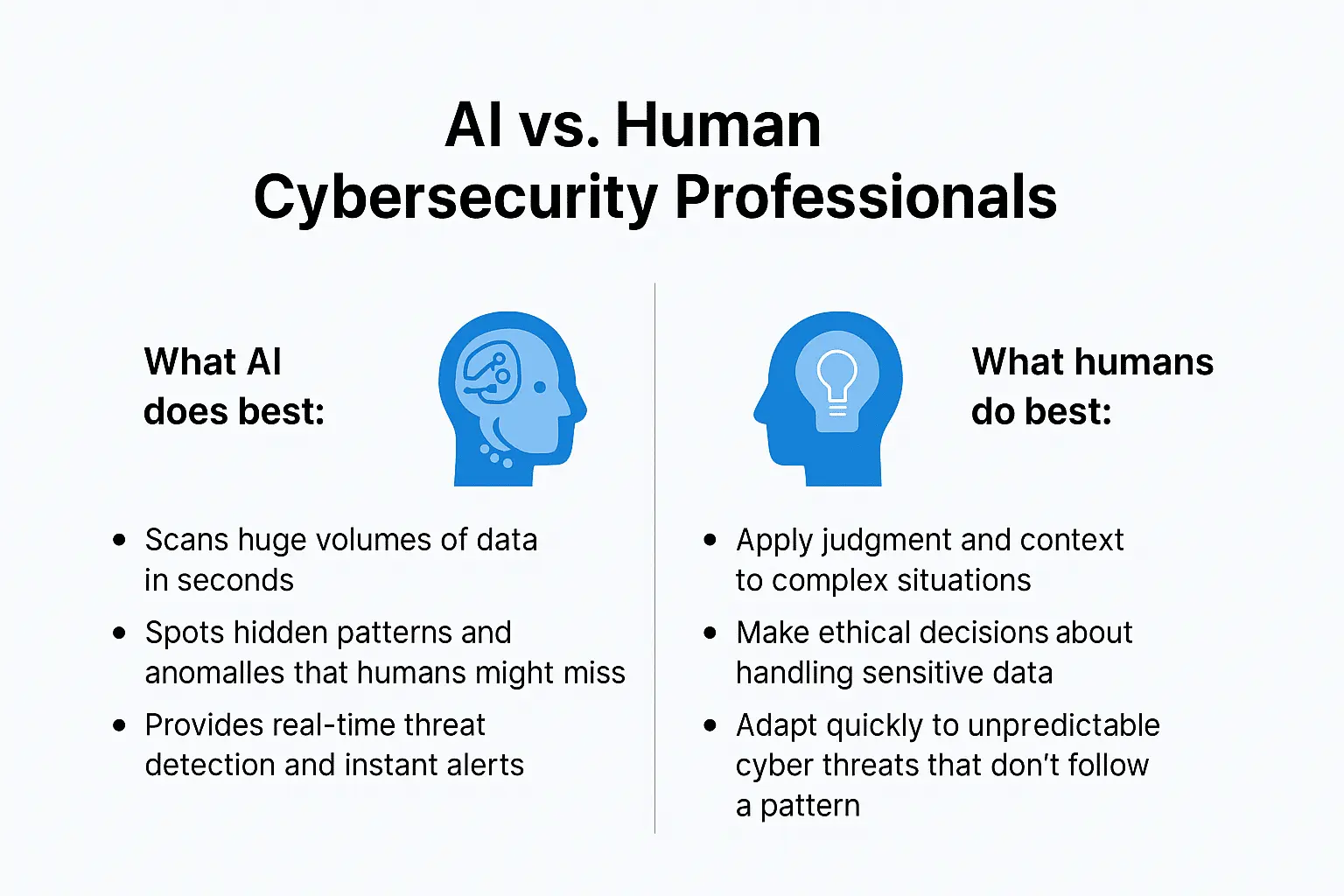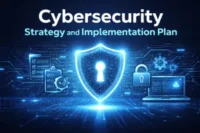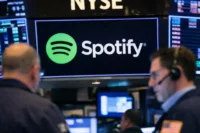Will AI Replace Cybersecurity? Jobs, Engineers & the Future of Cyber Defense
Published: 16 Sep 2025
AI in cybersecurity is no longer a futuristic idea — it’s already here. From real-time threat detection to analyzing massive datasets, AI systems are becoming a core part of how organizations defend against modern cyber threats.
But with this rise in automation comes a big question: Will AI replace cybersecurity and the professionals who work in it? Some fear that roles like cybersecurity engineers and analysts could disappear, while others believe AI will simply enhance security teams, making them faster and more effective.
In this article, we’ll break down what AI can and can’t do in cybersecurity, explore whether cybersecurity jobs are truly at risk, and uncover why the future is likely to be built on collaboration between humans and intelligent machines — not one replacing the other.
Table of Contents
Understanding AI in Cybersecurity
To understand whether AI can replace cybersecurity, we first need to see how it is currently applied in the field. At its core, artificial intelligence (AI) uses machine learning and generative AI models to analyze massive datasets, recognize patterns, and adapt to new cyber threats.
Unlike traditional security systems, which rely on predefined rules and manual oversight, AI-powered cybersecurity can operate in real time. For example, AI can detect anomalies in network traffic, flag suspicious activity, and even predict potential data breaches before they occur. This ability to analyze threats at scale gives organizations a significant advantage against evolving attack methods.
However, AI is not a silver bullet. While AI systems excel at automation and speed, they often lack the contextual awareness and ethical reasoning that cybersecurity professionals bring. Understanding this balance is key before we dive deeper into whether AI could ever replace cybersecurity jobs or engineers.
Will AI Replace Cybersecurity Entirely?
The question of whether AI will replace cybersecurity often comes from a misunderstanding of what AI actually does. Yes, AI systems are powerful — they can process more data in a few seconds than a human analyst could in weeks. They can spot patterns invisible to the naked eye, respond to cyber threats in real time, and even automate routine tasks like log monitoring or patching vulnerabilities.
But replacing cybersecurity altogether? That’s unlikely.
Here’s why: AI is only as strong as the data and algorithms behind it. While it can learn from millions of attack scenarios, it still struggles with nuance, creativity, and intent. Attackers are constantly innovating, finding ways to exploit gaps that machine learning models may not anticipate. This is where cybersecurity professionals come in — applying context, ethical judgment, and hands-on experience that machines cannot replicate.
Think of AI not as a replacement, but as an accelerator. It reduces the heavy lifting, allows security teams to focus on complex decision-making, and provides faster, more accurate threat detection. The future isn’t about choosing between humans or machines. It’s about combining both.
Will Cybersecurity Jobs Be Replaced by AI?
One of the biggest concerns around artificial intelligence in security is the impact on jobs. Headlines asking “Will cybersecurity jobs be replaced by AI?” fuel anxiety among professionals who worry their skills may soon be outdated.
The truth is more nuanced. AI is certainly changing the nature of work in cybersecurity. Repetitive, labor-intensive tasks — such as scanning for vulnerabilities, sorting through alerts, or analyzing log files — can now be handled by AI-powered tools. This reduces workload for human analysts, but it doesn’t make them obsolete.
Instead of replacing jobs outright, AI is reshaping them. Cybersecurity professionals are moving into roles that focus on strategy, oversight, and decision-making. For example, while an AI system may flag a suspicious login attempt, it takes a human to determine whether it’s a false alarm or part of a coordinated attack. Likewise, ethical decisions around handling sensitive data remain firmly in the hands of people, not algorithms.
So rather than eliminating jobs, AI is shifting the skill sets required. The cybersecurity experts of tomorrow will need to understand how machine learning works, how to manage AI systems, and how to ensure that automation strengthens — rather than weakens — overall security.
The Future of Cybersecurity Engineers in an AI World
Another pressing question is: Will AI replace cybersecurity engineers? At first glance, it might seem possible. After all, AI can automate routine monitoring, detect anomalies in real time, and even recommend fixes for certain vulnerabilities.
But the reality is different. Cybersecurity engineers aren’t being pushed out — they’re being pushed forward. As organizations adopt AI-powered defenses, engineers are taking on new responsibilities:
- AI supervisors – overseeing how algorithms make decisions.
- Model trainers – feeding AI systems quality data to improve threat detection.
- Strategic defenders – focusing on architecture, resilience, and adapting security frameworks to evolving cyber threats.
Unlike machines, engineers bring creativity, adaptability, and ethical judgment. For example, an AI tool may detect unusual activity, but deciding whether to isolate a system, alert authorities, or investigate internally requires human experience.
In short, engineers won’t be replaced by AI — they’ll evolve into AI-enabled problem-solvers. The future belongs to hybrid teams, where cybersecurity professionals and intelligent systems work side by side to protect sensitive data and stay ahead of attackers.
AI vs. Human Cybersecurity Professionals

When people ask if AI will replace cybersecurity, what they’re really asking is: Who does it better — machines or humans? The answer isn’t black and white. Both bring unique strengths to the table.
What AI does best:
- Scans huge volumes of data in seconds.
- Spots hidden patterns and anomalies that humans might miss.
- Provides real-time threat detection and instant alerts.
What humans do best:
- Apply judgment and context to complex situations.
- Make ethical decisions about handling sensitive data.
- Adapt quickly to unpredictable cyber threats that don’t follow a pattern.
Think of it like this: AI is the microscope, and humans are the scientists. One without the other doesn’t work. An AI system can flag suspicious behavior, but it takes a cybersecurity professional to confirm whether it’s a harmless login from a traveling employee — or the start of a major data breach.
That’s why the future isn’t about AI versus humans. It’s about AI and humans, working together to build stronger defenses.
Risks and Limitations of AI in Cybersecurity
While AI is powerful, it’s not without flaws. In fact, relying too heavily on automation can create new risks.
One major concern is false positives and false negatives. An AI system might flood security teams with alerts that turn out to be harmless — or worse, it could miss a sophisticated cyber threat because it didn’t fit the expected pattern.
Another limitation is that AI can be tricked. Hackers are already experimenting with adversarial AI, where they intentionally feed misleading data to confuse security systems. This means attackers could use AI not only to launch cyber attacks, but also to blind the very tools designed to stop them.
There’s also the issue of data quality. If an AI model is trained on biased, outdated, or incomplete data, its predictions won’t be reliable. And since cybersecurity often involves sensitive data, errors here can lead to major data breaches or compliance failures.
Finally, AI lacks accountability. If an algorithm makes the wrong call — say, shutting down critical systems or exposing private information — someone has to be responsible. That’s why cybersecurity professionals remain essential, providing oversight and making sure that AI tools are used safely and ethically.
The Hybrid Future: AI-Powered Security Teams
The future of cybersecurity isn’t about humans being replaced. It’s about humans and AI working together. In fact, the most effective security teams will be those that combine the speed of AI systems with the judgment of cybersecurity professionals.
Here’s what that future looks like:
- AI handles the heavy lifting – scanning millions of data points, identifying unusual activity, and providing real-time threat detection.
- Humans handle the strategy – deciding how to respond, ensuring ethical use of sensitive data, and staying one step ahead of attackers.
- Collaboration becomes the norm – with AI reducing noise and false alerts, analysts and engineers can focus on complex cyber threats that require creative solutions.
Far from making jobs disappear, AI will likely create new ones. Professionals who can manage, train, and supervise AI-powered systems will be in high demand. This shift means the role of cybersecurity engineers and analysts won’t vanish — it will evolve into something even more valuable.
In short, the strongest defense will come from hybrid security teams, where humans and machines complement each other’s strengths. That’s how organizations will protect themselves in the coming decade.
Conclusion
So, will AI replace cybersecurity? The evidence suggests not. While AI systems are becoming more advanced and capable of handling routine tasks, they are far from replacing the expertise of cybersecurity professionals.
What we’re seeing instead is a transformation. AI provides unmatched speed, automation, and real-time threat detection, but it lacks the creativity, adaptability, and ethical reasoning that humans bring. On the other hand, relying only on traditional security methods without AI would leave organizations vulnerable to the growing scale of cyber threats.
The future lies in partnership. AI-powered tools will continue to handle the heavy data work, while security teams and engineers will focus on strategy, oversight, and protecting sensitive data. This balance ensures that AI doesn’t replace cybersecurity — it redefines it.
In the end, the strongest shield against attackers won’t be humans or machines alone. It will be humans and AI, working side by side.
FAQs-Will AI Replace Cybersecurity?
What is AI’s role in cybersecurity?
AI is mainly used for threat detection, anomaly monitoring, and data analysis. It helps identify unusual patterns in real time, filter false alerts, and support security teams by handling repetitive tasks.
Will AI replace cybersecurity jobs?
AI won’t fully replace jobs, but it will change them. Routine work like log analysis or patching may be automated, while human professionals focus on strategy, oversight, and handling sensitive data.
What are the risks of using AI in cybersecurity?
AI can make mistakes if it’s trained on poor-quality data, leading to false positives or missed threats. It’s also vulnerable to adversarial attacks, where hackers try to trick the system. Most importantly, AI lacks human judgment and ethical reasoning.
Can AI replace cybersecurity engineers?
No. AI can support engineers by detecting vulnerabilities and speeding up analysis, but engineers are still needed to design systems, supervise AI tools, and make decisions when threats don’t fit predictable patterns.
What does the future of cybersecurity look like with AI?
The future will be hybrid. AI will handle scale and automation, while humans will bring context, creativity, and decision-making. The strongest defenses will come from AI-powered security teams working together with skilled professionals.

- Be Respectful
- Stay Relevant
- Stay Positive
- True Feedback
- Encourage Discussion
- Avoid Spamming
- No Fake News
- Don't Copy-Paste
- No Personal Attacks

- Be Respectful
- Stay Relevant
- Stay Positive
- True Feedback
- Encourage Discussion
- Avoid Spamming
- No Fake News
- Don't Copy-Paste
- No Personal Attacks






